★★½
“Topples over from worthy into over-earnest.”
 Let me start with the Amazon synopsis, since this explains what it’s doing here: “Dreya Weber stars as Alex, a decorated Marine officer who is unexpectedly discharged from her wartime duty. Returning to her conservative home town she agrees to coach and counsel the precocious teen rebel Saffron (Paris Pickard). Alex is the no-nonsense role model and authority figure that Saffron needs, and in true Karate Kid style she inspires the young woman s transition from slacker to boot camp-ready Marine recruit. But as Saffron is finally finding the strength to grow up, Alex must find new courage to face her own demons.” While not technically incorrect in any detail, it’s probably significant that it makes absolutely no mention of a very significant plot element, which impacts just about all other aspects of the story. Alex was kicked out of the Marines for being a lesbian.
Let me start with the Amazon synopsis, since this explains what it’s doing here: “Dreya Weber stars as Alex, a decorated Marine officer who is unexpectedly discharged from her wartime duty. Returning to her conservative home town she agrees to coach and counsel the precocious teen rebel Saffron (Paris Pickard). Alex is the no-nonsense role model and authority figure that Saffron needs, and in true Karate Kid style she inspires the young woman s transition from slacker to boot camp-ready Marine recruit. But as Saffron is finally finding the strength to grow up, Alex must find new courage to face her own demons.” While not technically incorrect in any detail, it’s probably significant that it makes absolutely no mention of a very significant plot element, which impacts just about all other aspects of the story. Alex was kicked out of the Marines for being a lesbian.
While knowing that likely would not have impacted my selection of the film, I would have to say the heavy emphasis placed on it likely did detract from my enjoyment. Not, I should stress, for the gay angle. The issue would be exactly the same if the lead character had been heterosexual, and defined to an equal degree by her relationships, because that’s the kind of thing I expect from a soap-opera character, rather than an action heroine. It’s clear the topic of “Don’t ask, don’t tell” is a subject about which both director and star felt passionately, and it’s perhaps unfortunate (for the film, rather than those affected by it!) the policy was revoked by the US government shortly after the movie’s release, rendering it a lot of well-intentioned hand-wringing about not much, from a 2016 perspective.
The rest of this isn’t bad, although the ease with which Saffron is turned around by Alex is remarkable, suggesting that a stint in boot camp is just the cure all America’s disaffected youth requires. The synopsis does nail this as in “True Karate Kid style”, being roughly as plausible. But I do have to say, Weber completely nails the Marine thing, both in well-muscled physical appearance – and, perhaps more importantly, the attitude of quiet, coiled energy and absolutely confidence in her own abilities. Yet there’s also a streak of aggression, and some which is perfect for a soldier, yet less compatible with civilian life, and causes no shortage of issues, especially when combined with Alex’s tendency to react first. There’s likely enough meat there for a story, without having to add the sexual politics angle which, as noted above, has not dated particularly well, and to be honest, becomes moral overkill before the final credits roll – complete with another nugget of social justice. No, the topic isn’t the problem here: it’s the heavy-handed treatment.
Dir: Ned Farr
Star: Dreya Weber, Paris P. Pickard, Christine Mourad, Anthony Michael Jones





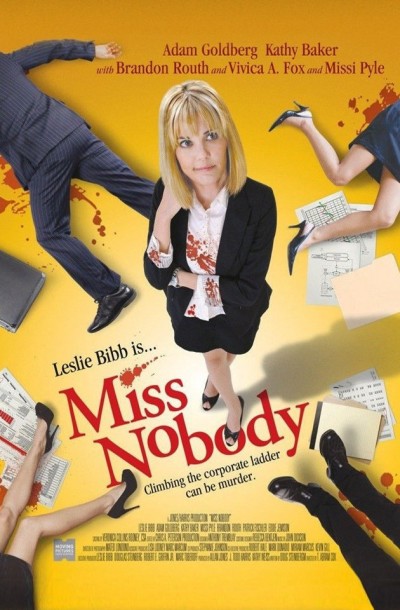
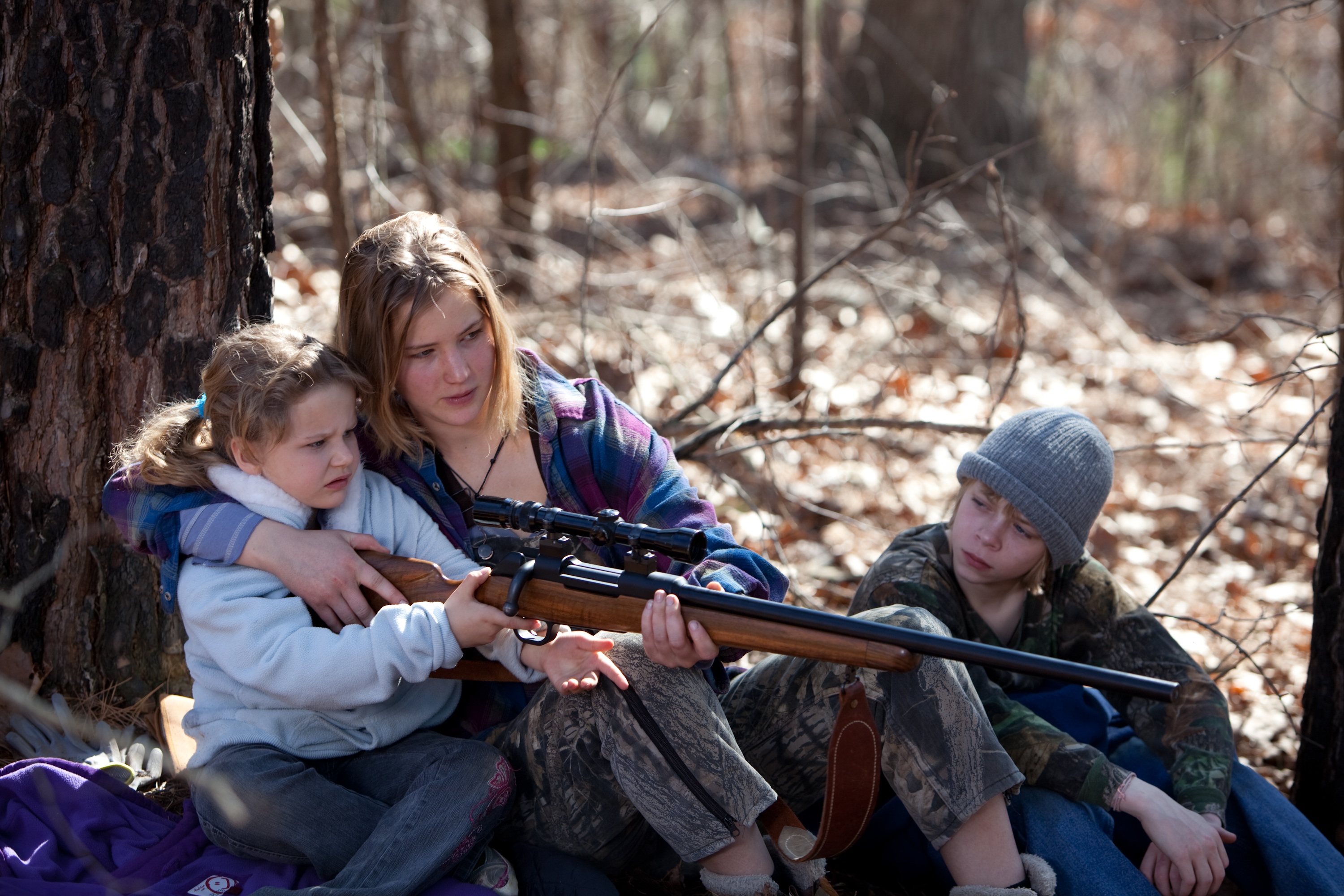
 Part one was deemed by the qualification panel as falling short of the necessary minimum level for inclusion here, being a mix of poignant drama about an elderly man whose lifelong companion’s battery is running down, and porn. The sequel, however, just about does enough to qualify, albeit while retaining a hefty dose of the latter aspect – and you don’t need to have seen part one either. Here, disgruntled scientist Professor Uegusa (Horiken) hatches a plan to destroy the appearance-based culture of romance, and to finance this sends out his “hostroids”, attractive male androids, in a variety of guises, e.g. office manager, door-to-door salesman, etc. to seduce woman and bilk them of their savings. He also sends them to kill rival researcher Dr. Kouenji, who had been building a countermeasure, in the form of a maid android, Maria (Yoshizawa). Before his death, Kouenji sends Maria to geeky student Shotarou (Haraguchi), but she isn’t ready, needing her “love circuit” activated before she can attain her full potential needed to defeat Uegusa and the hostroids. Can Shotarou manage that final step before the hostroids take him and Maria down?
Part one was deemed by the qualification panel as falling short of the necessary minimum level for inclusion here, being a mix of poignant drama about an elderly man whose lifelong companion’s battery is running down, and porn. The sequel, however, just about does enough to qualify, albeit while retaining a hefty dose of the latter aspect – and you don’t need to have seen part one either. Here, disgruntled scientist Professor Uegusa (Horiken) hatches a plan to destroy the appearance-based culture of romance, and to finance this sends out his “hostroids”, attractive male androids, in a variety of guises, e.g. office manager, door-to-door salesman, etc. to seduce woman and bilk them of their savings. He also sends them to kill rival researcher Dr. Kouenji, who had been building a countermeasure, in the form of a maid android, Maria (Yoshizawa). Before his death, Kouenji sends Maria to geeky student Shotarou (Haraguchi), but she isn’t ready, needing her “love circuit” activated before she can attain her full potential needed to defeat Uegusa and the hostroids. Can Shotarou manage that final step before the hostroids take him and Maria down? I’m on the fence with regard to the Japanese uber-gore films, most notably, by the Sushi Typhoon studio, which have achieved renown (or infamy) of late. While some (
I’m on the fence with regard to the Japanese uber-gore films, most notably, by the Sushi Typhoon studio, which have achieved renown (or infamy) of late. While some ( This is definitely a case where less would have been more, and with a more enthusiastic hand on the editor’s knife, this could have become a decent eighty-minute feature – and possibly an even better 50-minute one. Kamikura does often demonstrate an awareness and acceptance of exactly how ludicrous the entire scenario is, and the film is at its best when wholeheartedly embracing its own insanity. For instance, each of the cyborg athletes’ talents is influenced by their sport: Hitomi Oka is a tennis-player, so whacks people with an over-sized, pneumatic racket, and lobs exploding tennis-balls at them. Additional helpings of that kind of imaginative lunacy – and considerably less tied-up schoolgirls being prodded or whipped – would certainly have made for a more entertaining end product.
This is definitely a case where less would have been more, and with a more enthusiastic hand on the editor’s knife, this could have become a decent eighty-minute feature – and possibly an even better 50-minute one. Kamikura does often demonstrate an awareness and acceptance of exactly how ludicrous the entire scenario is, and the film is at its best when wholeheartedly embracing its own insanity. For instance, each of the cyborg athletes’ talents is influenced by their sport: Hitomi Oka is a tennis-player, so whacks people with an over-sized, pneumatic racket, and lobs exploding tennis-balls at them. Additional helpings of that kind of imaginative lunacy – and considerably less tied-up schoolgirls being prodded or whipped – would certainly have made for a more entertaining end product.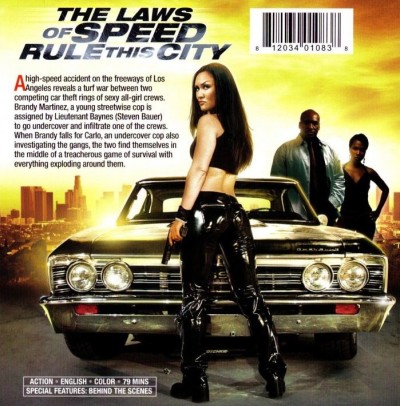 After a freeway chase ends in a fatal crash, a policewoman (Lizette) goes undercover to infiltrate the warring gangs of car thieves responsible. As “Baby” Martinez, she helps Eve (Lethridge) evade capture by an irate car-owner and, as a result, is recruited to join the all-female group of which Eve is a part, operating under the protection of Mama (Olivia Brown). However, Eve has a past to contend with, having defected from the gang led by Knight (Parker) – and worse still, taken his classic car with her. Unknown to her, the trunk holds a stash of drugs, whose loss leaves Knight feeling the heat from those in the criminal food chain above him. As a result, he’s prepared to go to any lengths to recover his property.
After a freeway chase ends in a fatal crash, a policewoman (Lizette) goes undercover to infiltrate the warring gangs of car thieves responsible. As “Baby” Martinez, she helps Eve (Lethridge) evade capture by an irate car-owner and, as a result, is recruited to join the all-female group of which Eve is a part, operating under the protection of Mama (Olivia Brown). However, Eve has a past to contend with, having defected from the gang led by Knight (Parker) – and worse still, taken his classic car with her. Unknown to her, the trunk holds a stash of drugs, whose loss leaves Knight feeling the heat from those in the criminal food chain above him. As a result, he’s prepared to go to any lengths to recover his property.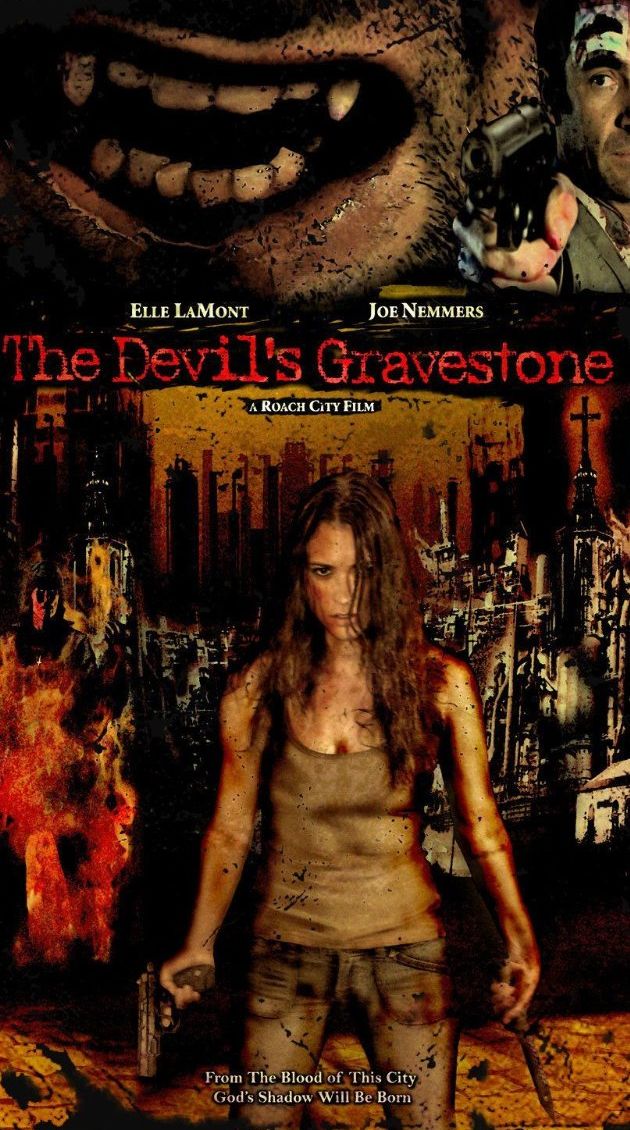
 Surely one of the great B-movie exploitation titles of all-time, this inevitably can’t live up to the expectations that generates, though in the early going, it makes a half-decent effort. Certainly, it’s more entertaining than Guzman’s previous Run! Bitch Run!, though it does suffer from some of the same mean-spirited unpleasantness. The heroine is Sister Sarah (Ortega), who has been a long-term victim of the Catholic Church, which is portrayed here as the embodiment of just about every evil imaginable, being neck-deep in drugs, prositution and other equally-dubious activities, with their partners, the Los Muertos biker gang. Finally, Sarah has a vision from God, telling her it’s time to clean house: she starts at the bottom, and works her way up to Chavo (Castro) and Father Carlittos (D’Marco). Along the way, yes, there is no shortage of nude nuns – or other women – though, to be honest, the guns aren’t actually all
Surely one of the great B-movie exploitation titles of all-time, this inevitably can’t live up to the expectations that generates, though in the early going, it makes a half-decent effort. Certainly, it’s more entertaining than Guzman’s previous Run! Bitch Run!, though it does suffer from some of the same mean-spirited unpleasantness. The heroine is Sister Sarah (Ortega), who has been a long-term victim of the Catholic Church, which is portrayed here as the embodiment of just about every evil imaginable, being neck-deep in drugs, prositution and other equally-dubious activities, with their partners, the Los Muertos biker gang. Finally, Sarah has a vision from God, telling her it’s time to clean house: she starts at the bottom, and works her way up to Chavo (Castro) and Father Carlittos (D’Marco). Along the way, yes, there is no shortage of nude nuns – or other women – though, to be honest, the guns aren’t actually all  Though nominally a Western, this perhaps has more in common with the surreal works of Alejandro Jodorowsky, in particular El Topo, with mystical elements and downright weirdness. Ransom Pride (Scott Speedman, from the Underworld series) is killed in a gun-battle while trying to broker an arms deal with the locals. His corpse is kept by the local bruja, or witch (de Pablo), because her brother also died in the fight, shot by Ransom. That doesn’t sit well with his lover, Juliette (Caplan), a half-breed who has been raised in blood since slitting the throat of the Mexican general who killed her parents, while still not yet a teenager. She returns to Ransom’s home, and recruits his brother (Foster) to help recover the body, on the way back to Mexico, meeting a bevy of strange characters and situations. Their mission doesn’t sit well with the Pride patriarch (Yoakam), a gun-fighter turned preacher, who sets loose a pair of hunters, but is prepared to get his own hands dirty in pursuit of that “whore of Babylon.”
Though nominally a Western, this perhaps has more in common with the surreal works of Alejandro Jodorowsky, in particular El Topo, with mystical elements and downright weirdness. Ransom Pride (Scott Speedman, from the Underworld series) is killed in a gun-battle while trying to broker an arms deal with the locals. His corpse is kept by the local bruja, or witch (de Pablo), because her brother also died in the fight, shot by Ransom. That doesn’t sit well with his lover, Juliette (Caplan), a half-breed who has been raised in blood since slitting the throat of the Mexican general who killed her parents, while still not yet a teenager. She returns to Ransom’s home, and recruits his brother (Foster) to help recover the body, on the way back to Mexico, meeting a bevy of strange characters and situations. Their mission doesn’t sit well with the Pride patriarch (Yoakam), a gun-fighter turned preacher, who sets loose a pair of hunters, but is prepared to get his own hands dirty in pursuit of that “whore of Babylon.”
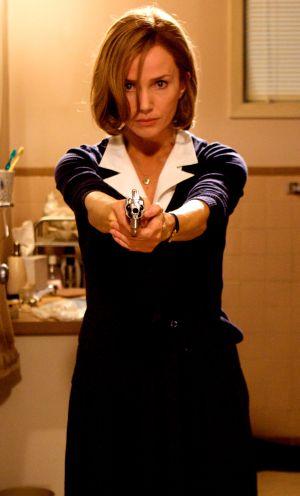 A loose remake of a somewhat infamous 1980 horror movie [rejected by the BBFC and as yet unreleased in the UK], this is a nastily brutal and effective home-invasion story, with a maternal angle that’s both surprising and well done. On the run after a botched bank robbery, the three Koffin brothers end up in the wrong home, and end up with a houseful of hostages, who were visiting Beth Sohapi (King) and her husband. The criminals call on the rest of their family for help, led by their mother (De Mornay), who is 50% June Cleaver – even providing cake and ice-cream for the residents – and 50% Lizzie Borden, showing absolutely no restraint against anyone she perceives as threatening her brood. As the night progresses, a lot of skeletons come out and we discover the Sohapis definitely do not live up to their name…
A loose remake of a somewhat infamous 1980 horror movie [rejected by the BBFC and as yet unreleased in the UK], this is a nastily brutal and effective home-invasion story, with a maternal angle that’s both surprising and well done. On the run after a botched bank robbery, the three Koffin brothers end up in the wrong home, and end up with a houseful of hostages, who were visiting Beth Sohapi (King) and her husband. The criminals call on the rest of their family for help, led by their mother (De Mornay), who is 50% June Cleaver – even providing cake and ice-cream for the residents – and 50% Lizzie Borden, showing absolutely no restraint against anyone she perceives as threatening her brood. As the night progresses, a lot of skeletons come out and we discover the Sohapis definitely do not live up to their name…